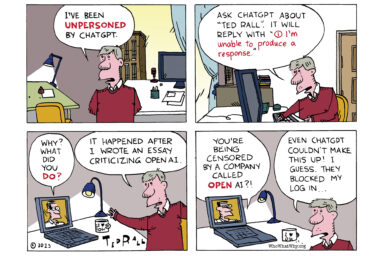The EU Commission on Friday issued a preliminary finding that Elon Musk's X likely violated Europe's Digital Services Act. If that finding is confirmed, the company faces a hefty fine that could total $200 million.
|
Listen To This Story
|
The EU Commission on Friday notified X, the social media platform formerly known as Twitter, that it has likely violated the European Union’s Digital Services Act (DSA) by misleading its users, lacking transparency with regard to advertising, and blocking researchers’ access to certain data.
“Today we issue for the first time preliminary findings under the Digital Services Act. In our view, X does not comply with the DSA in key transparency areas, by using dark patterns and thus misleading users, by failing to provide an adequate ad repository, and by blocking access to data for researchers,” said Margrethe Vestager, the executive vice president for a Europe Fit for the Digital Age. “The DSA has transparency at its very core, and we are determined to ensure that all platforms, including X, comply with EU legislation.”
One key issue is a change in how the site awards “verified account” status, i.e., the blue checkmark Twitter was known for. In the past, it had to be earned. Since Elon Musk purchased the platform, however, it is now simply for sale.
According to the Commission, this “does not correspond to industry practice and deceives users.” In addition, it also diminishes a users’ ability to “make free and informed decisions about the authenticity of the accounts and the content they interact with.”
Finally, the Commission finds that “there is evidence of motivated malicious actors abusing the ‘verified account’ to deceive users,” which echoes prior concerns that X has become one of the world’s leading purveyors of misinformation.
“Back in the day, BlueChecks used to mean trustworthy sources of information,” said Thierry Breton, Commissioner for Internal Market. “Now with X, our preliminary view is that they deceive users and infringe the DSA.”
In a response posted to his platform, Musk (who is not a source of accurate information) pushed back.
“The European Commission offered X an illegal secret deal: if we quietly censored speech without telling anyone, they would not fine us,” he wrote. “The other platforms accepted that deal. X did not.”
Musk did not provide information regarding what this supposed deal would have looked like or how he knows that the other platforms, many of which are also under investigation for violating the DSA, came to an agreement with the Commission.
The EU, which has been the tip of the spear in terms of taking on Big Tech companies, also charges X with not complying with the “required transparency on advertising” and prohibiting “eligible researchers from independently accessing its public data” in contradiction to its terms of service.
The Commission stressed that the issuing of preliminary findings is not a determination of guilt on the part of the social media platform, which can now defend itself against the charges.
“X has now the right of defense — but if our view is confirmed we will impose fines and require significant changes,” said Breton.
And these fines can be hefty.
A finding of non-compliance with the DSA can result in a fine of up to 6 percent of the platform’s annual revenue.
While that revenue has declined under Musk, based on last year’s figures, such a penalty could total $200 million. Or, in other words, it would be as much as Musk makes from selling 25 million blue checkmarks, which cost $8 a month.
But there are not just potential monetary penalties (including requiring X to also make periodic payments until it is in compliance). The Commission could also impose “an enhanced supervision period to ensure compliance with the measures the provider intends to take to remedy the breach.”
Of course, Musk could also decide to no longer operate in Europe, which would probably be a real downer for those disseminating misinformation in the territory of the EU.



